Nov . 05, 2024 09:37 Back to list
h pylori diagnosis manufacturers
Helicobacter Pylori Diagnosis Insights into Manufacturers and Technology
Helicobacter pylori (H. pylori) is a gram-negative bacterium that colonizes the human stomach, leading to various gastrointestinal diseases, including gastritis, peptic ulcers, and even gastric cancer. The prevalence of H. pylori infections makes it crucial to have effective and reliable diagnostic methods. Various manufacturers have developed advanced technologies to detect this bacterium, and understanding these diagnostic methods provides insight into the ongoing battle against stomach-related ailments.
Overview of H. pylori Diagnostics
Diagnosis of H. pylori can be accomplished through several methods, including endoscopic biopsies, non-invasive breath tests, serological tests, and stool antigen tests. Each method has unique advantages and challenges, impacting their suitability for different clinical scenarios.
1. Endoscopic Biopsy This method involves taking samples directly from the stomach lining during an upper gastrointestinal endoscopy. It is highly accurate, allowing for both culture and histological examination. However, it is invasive and generally used for patients with severe symptoms or when malignancy is suspected.
2. Urea Breath Test (UBT) This non-invasive test measures the presence of urease, an enzyme produced by H. pylori. Patients ingest a urea solution that is labeled with a carbon isotope. If H. pylori is present, the bacteria will metabolize the urea, producing carbon dioxide that can be detected in the patient's breath. This test is favored for its accuracy and non-invasive nature.
3. Serological Tests These tests detect antibodies against H. pylori in the blood. They are simple and quick but may not distinguish between current and past infections, which can lead to misinterpretations.
4. Stool Antigen Test This method detects specific antigens related to H. pylori in a stool sample. It is non-invasive and has a good sensitivity and specificity profile, making it suitable for both diagnosis and monitoring treatment success.
Manufacturers in H
. pylori DiagnosticsSeveral manufacturers play a pivotal role in advancing the technologies for diagnosing H. pylori. Their contributions include the development of more accurate, faster, and easier-to-use testing solutions.
h pylori diagnosis manufacturers

1. Thermo Fisher Scientific A leader in the diagnostics space, Thermo Fisher offers a range of diagnostic kits for H. pylori testing, including enzyme immunoassays for detecting antibodies and antigen detection tests for stool samples. Their state-of-the-art technologies ensure reliable results with quick turnaround times.
2. Qiagen Known for its molecular diagnostics, Qiagen produces tests that utilize advanced molecular techniques to identify H. pylori infections. Their products include sample preparation solutions and real-time PCR assays, which provide highly sensitive and specific results.
3. Abbott Laboratories Abbott's diagnostic products include the H. pylori IgG antibody test, which is widely used in various clinical settings. Abbott prioritizes user-friendly design and accuracy, making their tests a preferred choice in many laboratories.
4. Roche Diagnostics Roche offers a broad spectrum of diagnostic solutions, including automated systems that streamline the detection of H. pylori through serological and molecular testing. Their integrated systems provide healthcare professionals with enhanced efficiency and reliability.
5. Biohit Healthcare This company has developed unique H. pylori diagnostic solutions that focus on stool testing. Their tests are designed for easy application in both clinical and home settings, emphasizing convenience without compromising on quality.
Challenges and Future Directions
Despite the advancements in H. pylori diagnostics, several challenges remain. The adaptation of new technologies in clinical practice can be slow, and not all healthcare settings may have access to the latest diagnostic tools. Furthermore, the interpretation of results, especially from serological tests, can lead to confusion regarding active infections.
Looking forward, manufacturers are likely to focus on developing point-of-care testing solutions that are rapid, reliable, and user-friendly. Integrating molecular diagnostics will provide enhanced sensitivity and specificity, potentially leading to a more significant impact on patient management and public health.
Conclusion
The fight against H. pylori infections relies heavily on effective diagnostics. As manufacturers continue to innovate and improve testing methodologies, the hope is for better outcomes for patients suffering from H. pylori-related gastrointestinal issues. With ongoing research and development, the future of H. pylori diagnosis looks promising, ultimately leading to improved management and treatment strategies in the healthcare landscape.
-
Highly Accurate hCG Pregnancy Test Strips - 5 Min Results
NewsAug.02,2025
-
Premium Empty ABS Plastic Cassettes: Durable & Lightweight Storage
NewsAug.01,2025
-
Accurate Cocaine (Coc) Rapid Test Kit | Fast & Reliable Detection
NewsJul.31,2025
-
Accurate HCG Pregnancy Test Strips | Fast Home Use Kit
NewsJul.31,2025
-
Reliable Early Pregnancy Test Kit Supplier - Multi Plastic Cassette Options
NewsJul.30,2025
-
Transferrin Rapid Test Cassette – Reliable Tumor Marker Detection
NewsJul.29,2025

